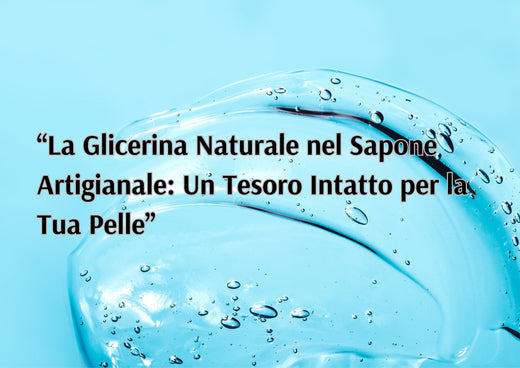
"Natural Glycerin in Artisan Soap: An Untouched Treasure for Your Skin" By MBK
Share
Saponification, the magical process that turns oils and fats into soap, is more than just a chemical reaction: it is a dance of ingredients that combine to create a product rich in skin benefits. Among the treasures that emerge from this process, glycerin plays a key role. If you have ever used artisanal soaps, you may have never stopped to think about its presence, but glycerin is one of the key ingredients that makes artisanal soap such a special product.
What is Glycerin and How It Forms in Soap
Glycerin is a natural humectant, which means it has the amazing ability to attract and hold moisture. But what many people don't know is that glycerin is a byproduct of the saponification process, the chemical reaction that occurs when vegetable oils (in our case, but some also use animal fats) are mixed with water and an alkaline base, such as lye. During this reaction, not only are the salts that make up soap formed, but glycerin is also naturally produced and remains in the final product.
This is one of the reasons why artisanal soaps are so beneficial for the skin: the glycerin, intrinsic to the process, is not eliminated, as happens in industrial soaps. In fact, natural glycerin helps keep the skin soft, hydrated and protected, avoiding the dryness and dehydration that other soaps can cause.
Glycerin in Mass Production: A Welfare Removed
In the case of industrial soaps, the story is quite different. Large soap companies tend to remove glycerin from their products, for a very simple reason: glycerin is a precious resource. It is extracted from industrial soaps and sold to cosmetic companies, where it is used to produce moisturizing creams and lotions.
While this practice is profitable for the industry, it also has a negative impact on the product that ends up in the hands of consumers. Without glycerin, industrial soaps tend to leave skin drier and less nourished, prompting consumers to purchase moisturizing products like creams and lotions separately. So, in essence, consumers pay twice for hydration: once for the soap that doesn’t contain glycerin, and once for the moisturizing products that are supposed to make up for the moisture loss from the skin.
The Advantage of Artisan Soap: A Natural Saving
On the contrary, artisanal soap keeps all its natural glycerin, which is developed during saponification and remains in the final product. This means that not only is the soap more gentle on the skin, but it also provides natural hydration that in many cases excludes the purchase of additional products to keep the skin soft and well nourished. Using artisanal soap means, therefore, saving not only in economic terms, but also in terms of time and skin health.
Furthermore, the glycerin contained in our artisanal soaps is an ecological resource, since it is not removed from the products that generate it, but remains intact, respecting the natural production process. Thus, by choosing an MBK soap, you are not only making a more economical choice, but also a more sustainable one.
Bottom Line: A Complete Skin Care Product
Artisan soap is a unique and complete resource for the skin. Not only does it gently cleanse, but it also nourishes and hydrates without the need for additional chemicals or expensive treatments. Choosing soaps that do not strip the skin of its natural moisture is a conscious choice for your health, your wallet and the planet.
Thanks for reading. Follow the blog for more articles like this. Love, MBK
